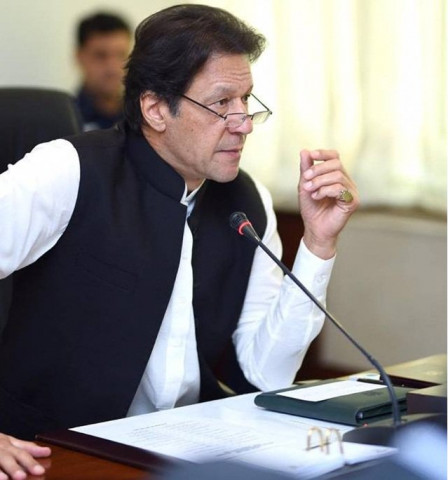PM Imran advised caution on IMF bailout deal
Best option is to seek loan on govt's terms, Asad Umar tells Economic Advisory Council

PM Imran Khan. PHOTO: PID
Umar shared his position with the prime minister during a meeting of the Economic Advisory Council (EAC), chaired by Khan at his office, highly-placed sources told The Express Tribune. The sources said that Prime minister Khan had invited the participants' views about the IMF programme.
Not surprisingly, the EAC members and a cabinet member who had previously worked with the global financial institutions, urged the government to sign the IMF deal. But Umar was backed by Dr Ashfaque Hasan Khan, a noted economist, and Dr Najeeb Khaqan, the Adviser to the finance ministry.
The sources said that Umar told the prime minister that the best option was to go the IMF on Pakistan's terms but the deal that the IMF had offered was not in the country's favour. He said that the second option was to find an alternative to the IMF.
The third and worst option was to sign the deal at IMF's terms, the sources quoted Umar as telling the prime minister. "My position is unchanged from day one and that is to negotiate a programme, which is good for Pakistan's economy and then sign it," Umar said, replying to a query by The Express Tribune.
According to the finance minister, his preference was "still a well-negotiated IMF programme and that was why we are engaged in active discussion with the IMF and will have next video conference on Thursday".
The staff-level talks between Pakistan and the IMF ended inconclusively in November last year after the government refused to accept the IMF's harsh conditions. Since then, the Pakistan Tehreek-e-Insaf (PTI) government has managed to secure breathing space after it won $14.5 billion worth of commitments from China, Saudi Arabia and United Arab Emirates.
These $14.5 billion commitments have helped largely bridge the external financing gap during the ongoing fiscal year. China has agreed to provide $2.5 billion in loans to Pakistan to boost official foreign exchange reserves. In July, China had also deposited $2 billion with the State Bank of Pakistan. In the past five years, China has emerged as Pakistan's single largest saviour in times of economic crisis.
A top government functionary told The Express Tribune that a consortium of Chinese banks would provide $2.5 billion in commercial loans at floating interest rates of London Interbank Offered Rate (LIBOR) plus over 3%. The amount is expected to be transferred to the central bank after holidays in China.
During the meeting, the sources said, Asad Umar shared some of the harsh conditions of the IMF programme with the EAC members: notably further increase in electricity prices and cutting back the budget deficit while ignoring the ground realities.
In order to make his point, Umar cited the example of Egypt, where poverty increased from nearly 30% to 53% due to the IMF programme, according to the meeting participants. Egypt steeply devalued its currency that even did not help reduce the current account deficit.
The IMF was also asking for total free float exchange rate regime, which the government is not willing to accept, Umar said. It has also asked to further increase the interest rates and keep the primary balance –the current expenditures excluding interest payments, positive, he added.
The sources said that Umar told the EAC that the indicators were moving, albeit slow, towards the right direction. He said that the stock market had started gaining momentum and the foreign portfolio investment remained positive in January.
A provincial government representative advised that the federal government should take a clear line of action –whether it wanted to go to the IMF, said the sources.
But despite the pitfalls of the current IMF offer, the EAC members who have worked with the international financial institutions urged the government to secure the deal with the IMF.
The meeting also discussed the roadmap for stability growth and productive employment. The meeting also discussed promoting digital economy.



















COMMENTS
Comments are moderated and generally will be posted if they are on-topic and not abusive.
For more information, please see our Comments FAQ